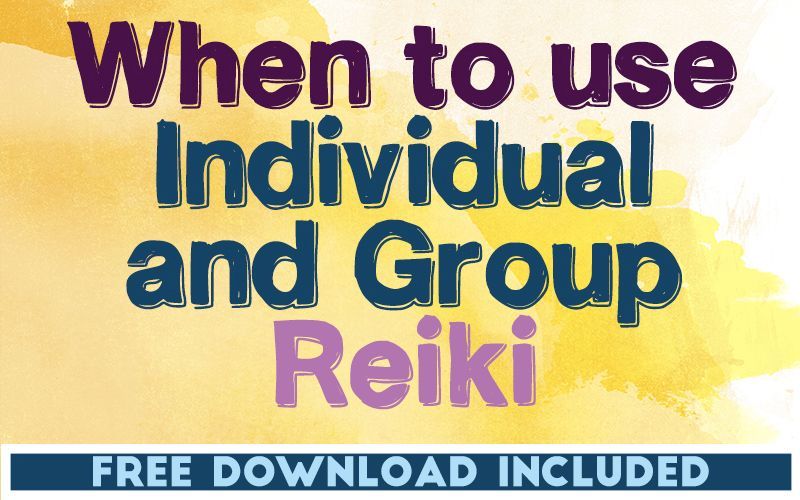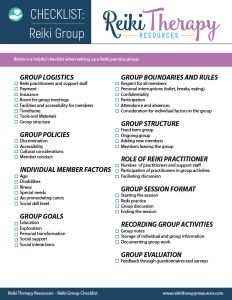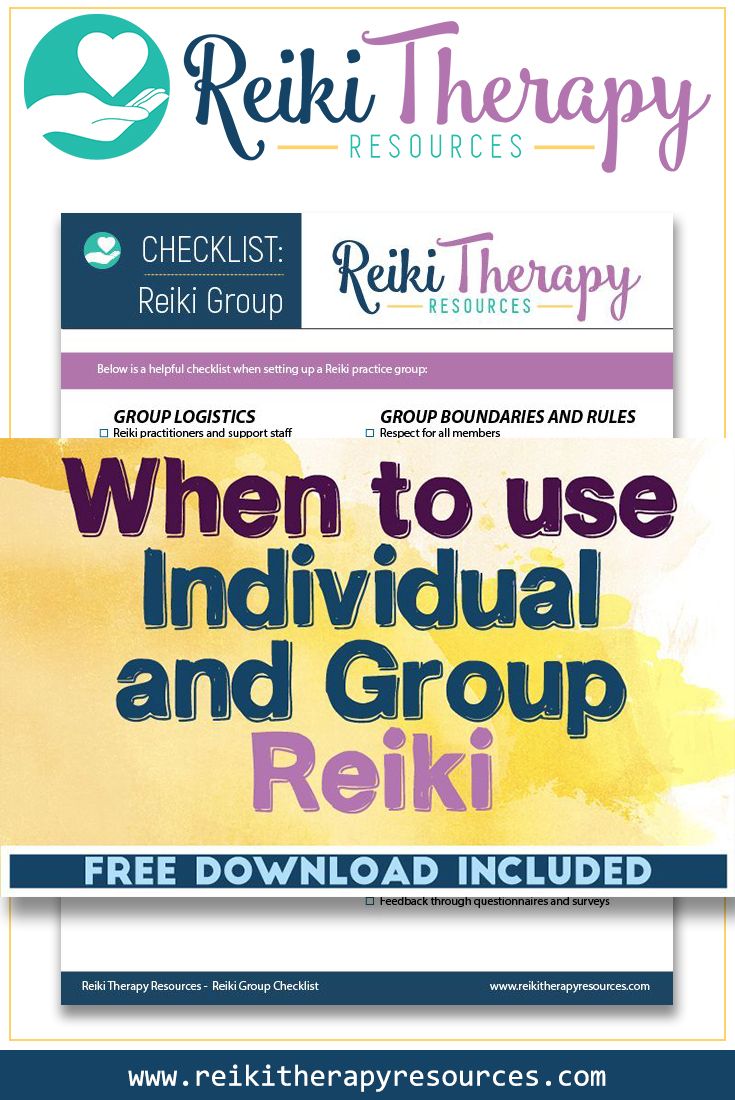
THIS POST INCLUDES:
——————————————–
1. Individual Reiki Therapy
2. Group Reiki Therapy
3. Styles of Reiki Groups
4. Running a Reiki Group
5. FREE DOWNLOAD Reiki Group Checklist
INDIVIDUAL REIKI THERAPY
Most practitioners will be familiar with the individual client model which is the most common form of client session work in private practice. Individual treatment is a one to one relationship between the client and the Reiki practitioner. This singular relationship allows a therapeutic alliance to develop based on specific connections between client and practitioner. It also provides a quicker process by which the client can explore their own personal issues with focused attention from their Reiki therapist.
In individual therapy, the Reiki practitioner is able to provide focused treatment that benefits the client specifically. Individual treatment is also more suitable for clients who have experienced issues that have feelings of shame or guilt associated with them. For clients who are feeling shame and embarrassment, the ability to undertake individual treatment in a private, safe and confidential space will facilitate more engagement with the client who can feel safe their experiences won’t be judged by other people that might be present in a group environment.
Individual sessions require motivation and focused attendance from the client who may otherwise hide amongst other people in a group setting.
Attending individual sessions can present as an introduction to Reiki groups for the client at a later date. Individual sessions may initially introduce Reiki to the client so that they can move into a group setting with more confidence. This can also work in the reverse manner where group Reiki sessions may introduce a client to undertaking more specific individual sessions,
Individual sessions provide the client with the ability to attend sessions at a time that is solely convenient for themselves. This increases the likelihood of the client attending each session when they have control over the session dates.
GROUP REIKI THERAPY
Group therapy reduces the one to one ratio of client and Reiki practitioner contact, however, it delivers additional benefits from being part of a group. Individuals who participate in group therapy can interact with others who are experiencing the same problems, emotions, and experiences as themselves. This can help the individual client feel less isolated by seeing that others understand their experience.
Additional people in the group expands the opportunity for the client to develop emotional connections with other group members. Clients can receive support from other members of the group as well as provide support to other members of the group. This exchange of support helps establish a framework for giving and receiving with other people in a well supported environment.
The opportunity for open discussion within a group environment can be beneficial for a client as they can be encouraged to participate based on the interactions of other members who express similar thoughts and emotions. The dynamic of a group of people can provide a feeling of safety for clients who feel intimidated by the intimacy of individual work where the focus is solely on the individual client.
Group therapy provides an opportunity for each individual to gain a broader perspective of their individual experiences in context with how other people are facing similar circumstances. This understanding may help the client by showing they are not alone in their experience. The client may also be inspired by other group members who have progressed to stages that the individual aspires to work towards.
Group therapy allows the Reiki practitioner or numerous practitioners to help a larger number of people compared to individual therapy. The ability to help a larger number of people in group therapy may be critical to an individual member who might otherwise have been unable to attend individual sessions due to cost and the access to individual sessions.
There are downsides to groups which may affect your client. Your client may feel intimidated by other personalities that are extroverted.
Group therapy settings can also be problematic for maintaining confidentiality amongst participants. Confidentiality and respect for other members opinions should be addressed at each session as a reminder to all participants of the group.
Groups can be more difficult to schedule for all participants. Additionally, Reiki practitioners need to provide the necessary resources for larger groups of people to accommodate all participants.
STYLES OF REIKI GROUPS
Some types of Reiki groups include:
- OPEN PRACTICE – the group works openly and collectively for each participant in a circle. The setting is informal and no themes or specific goals are established.
- GOAL ORIENTATED OR THEME BASED – the group meets to address specific issues or experiences such as grief, anger or divorce.
- SOCIAL ACTION GROUPS – this style is an extension of the theme based group style and focuses on a social issue that the group may be facing. Examples include asylum seekers, natural disaster victims, and religious groups.
RUNNING A REIKI GROUP
If you are considering running a Reiki group, below is a checklist of areas to consider when setting up your group:
- Group facilitator – who are the Reiki practitioners involved in the group. Define the roles of each facilitator and practitioner.
- Group schedule – define a suitable location and time.
- Group demographics – participant demographics and size of the group.
- Group goals – you may want to include generalized and/or specific goals such as focusing on a specific issue
- Group rules – define boundaries for confidentiality, respect for group members, and general social rules.
- Group session structure – general guidelines for introduction, Reiki practice, any discussions, and closing rituals.
- Group effectiveness – evaluation of the group progress compared to the goals that were originally established.
- Contingencies – establish contingencies for the practicalities of running the group such as change of location and time.
- Conflict – establish protocols for dealing with conflict between group members.
FREE DOWNLOAD
SIGN UP below to receive your FREE DOWNLOAD. Once you enter your email address, you will receive access to the Free Reiki Group Checklist.

BUILD YOUR REIKI REFERENCE MATERIALS:
Pin this image to your Pinterest board.

SHARE KNOWLEDGE & PASS IT ON:
If you’ve enjoyed this post, please share it on Facebook, Twitter, Pinterest. Thank you!
